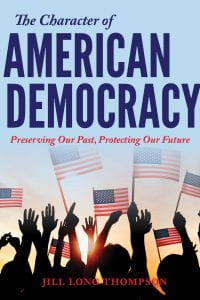Lee Hamilton, Leon Panetta, Marcy Kaptur, Paul Helmke and Richard Painter joining Jill Long Thompson at book’s launch
 BLOOMINGTON, Ind. – In the introduction to her new book, former Indiana congresswoman Jill Long Thompson tells the story of a dinner invitation from a powerful committee chairman to illustrate the importance of ethics to the future of American democracy.
BLOOMINGTON, Ind. – In the introduction to her new book, former Indiana congresswoman Jill Long Thompson tells the story of a dinner invitation from a powerful committee chairman to illustrate the importance of ethics to the future of American democracy.
“It was clear to me that none of the other members of Congress at the table that evening thought it was inappropriate for lobbyists to buy them dinner. They apparently saw no conflict of interest,” said Long Thompson, who chose to join the private dinner but opted only to drink a diet soft drink and reimbursed the host the next day.
The powerful committee chair that evening later was convicted on corruption charges and served prison time. “To this day, I believe he was a genuinely decent man, but he was human … Like many people he probably had never taken the time to seriously and diligently reflect on what constitutes ethical behavior,” she said. “Without ethics, democracy cannot survive.”
Long Thompson, who earned her MBA and doctorate from the Indiana University Kelley School of Business, has drawn upon experiences from her distinguished career in public service to teach at the business school and at the O’Neill School of Public and Environmental Affairs.
Her book, “The Character of American Democracy: Preserving Our Past, Protecting our Future (Indiana University Press),” will be published Sept. 15. Her colleagues for the last five years in Kelley’s Department of Business Law and Ethics and IU Press are co-hosting a virtual book launch that day from 4 to 5 p.m.
She will be joined in conversations by special guests, including Lee Hamilton, Distinguished Scholar and professor of practice in the Hamilton-Lugar School of Global and International Studies; Leon Panetta, former CIA director, secretary of defense and chief of staff to President Bill Clinton; Paul Helmke, professor of practice and director of the Civic Leaders Center in the O’Neill School; U.S. Rep. Marcy Kaptur, D-Ohio; and Richard Painter, the S. Walter Richey Professor of Corporate Law at the University of Minnesota. Registration is required.
Long Thompson began her political career with her election to the Valparaiso City Council in 1983. Six years later, she began representing Indiana in the U.S. House of Representatives, serving for three terms in a heavily Republican district. In 1995, Clinton nominated her to serve as the U.S. Department of Agriculture undersecretary for rural development.
In 2010, she was appointed by President Barack Obama to serve on the board of the Farm Credit Administration, rising to the position of board chair and CEO in 2012. In 2015, she came to teach at IU. She currently is a visiting scholar at the Ostrom Workshop.
The process of democracy is just as important as the outcome
A major point that she makes in the book is that democracy is an ethic concept of itself, because it is based on principles of equal opportunity to participate. It requires transparency in the process because the power comes from the people – from the ground up and not from the top down.
“The process by which we adopt policy, execute policy and enforce policy is as important as the policy itself,” Long Thompson said in an interview. “Agreeing with a candidate or a political leader’s positions is not sufficient in terms of support for those who lead. We have to also hold them accountable to following an ethical, democratic process. Otherwise, we undermine the process and we undermine democracy itself.
“To live in democracy is to take on the responsibility of being a caretaker of democracy,” she added. “If we don’t do that, we are shirking our responsibilities and the cost can be great. The democracy that we enjoy being a part of can truly come to an end.”
The book’s six chapters covers ethical and decision-making issues everyone faces as well as the challenges, opening with a chapter on “American Character” and closes it with one on “The American’s Character.” In between, she explores the role of ethics in democratic institutions and as it relates to capitalism.
Concerned over government and business leaders’ ethical lapses
Long Thompson said she wrote the book out of a concern that too many, including government and corporate leaders, should pay more attention to ethical aspects of “conducting the people’s business.”
“Since beginning work on this project, I have grown even more troubled by the lack of character and ethics among many who hold positions of leadership in both the public and private sectors,” she said. “It is also troubling that the public outcry has not been more widespread.”
She found students she taught in both Kelley and O’Neill schools to be “completely receptive” to the concepts of ethics in government and business.
“I found it very uplifting to teach young, dedicated, thoughtful future leaders for our country and our world,” she said. “Every semester, in every class, I had a number of students tell me that by the end of the semester they were thinking differently about ethics than when they first enrolled in the course. That suggests that they will be taking these ethics principles with them as they begin their professional careers and move into leadership positions in the corporate, government or not for profit sector.”
A lifelong Democrat, Long Thompson cites examples from both sides of the aisle. She hopes her book is seen as a bipartisan effort to remind all of us, not just elected officials, that everyone is responsible for protecting fairness of participation and integrity in elections, as well as in the adoption and execution of laws.
“One does not have to be perfect to be a person of character,” she said. “But living or leading with character does require a serious and continuous effort to seek truth and to make choices that respect the worth of the other people and other beings who inhabit our world … If we do better, we will be better – as individuals, as communities, as a nation and as a world.”
Before his passing, congressman and civil rights icon John Lewis praised the book. “We live in an age that demonstrates the powerful need for ethics in government. Democracy is a privilege that carries with it important responsibilities for the people and their representatives,” Lewis said. “As we look back on this era and determine the future of this nation, Dr. Long Thompson’s book will be a resource for Americans who are seeking ways to secure our democracy and our future as a nation.”
